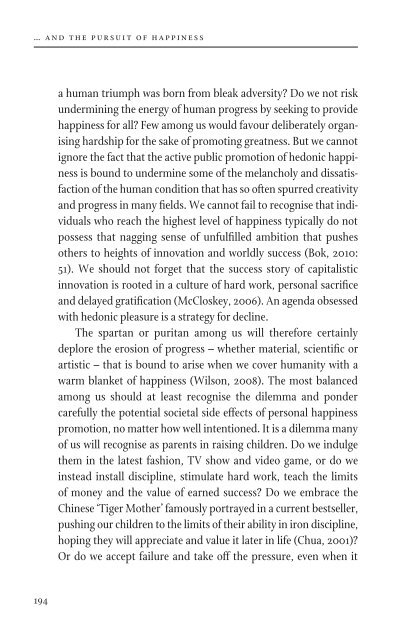… and the Pursuit of Happiness - Institute of Economic Affairs
… and the Pursuit of Happiness - Institute of Economic Affairs
… and the Pursuit of Happiness - Institute of Economic Affairs
Create successful ePaper yourself
Turn your PDF publications into a flip-book with our unique Google optimized e-Paper software.
<strong>…</strong> <strong>and</strong> <strong>the</strong> pursuit <strong>of</strong> happiness<br />
<strong>the</strong> unbearable lightness <strong>of</strong> happiness policy<br />
a human triumph was born from bleak adversity? Do we not risk<br />
undermining <strong>the</strong> energy <strong>of</strong> human progress by seeking to provide<br />
happiness for all? Few among us would favour deliberately organising<br />
hardship for <strong>the</strong> sake <strong>of</strong> promoting greatness. But we cannot<br />
ignore <strong>the</strong> fact that <strong>the</strong> active public promotion <strong>of</strong> hedonic happiness<br />
is bound to undermine some <strong>of</strong> <strong>the</strong> melancholy <strong>and</strong> dissatisfaction<br />
<strong>of</strong> <strong>the</strong> human condition that has so <strong>of</strong>ten spurred creativity<br />
<strong>and</strong> progress in many fields. We cannot fail to recognise that individuals<br />
who reach <strong>the</strong> highest level <strong>of</strong> happiness typically do not<br />
possess that nagging sense <strong>of</strong> unfulfilled ambition that pushes<br />
o<strong>the</strong>rs to heights <strong>of</strong> innovation <strong>and</strong> worldly success (Bok, 2010:<br />
51). We should not forget that <strong>the</strong> success story <strong>of</strong> capitalistic<br />
innovation is rooted in a culture <strong>of</strong> hard work, personal sacrifice<br />
<strong>and</strong> delayed gratification (McCloskey, 2006). An agenda obsessed<br />
with hedonic pleasure is a strategy for decline.<br />
The spartan or puritan among us will <strong>the</strong>refore certainly<br />
deplore <strong>the</strong> erosion <strong>of</strong> progress – whe<strong>the</strong>r material, scientific or<br />
artistic – that is bound to arise when we cover humanity with a<br />
warm blanket <strong>of</strong> happiness (Wilson, 2008). The most balanced<br />
among us should at least recognise <strong>the</strong> dilemma <strong>and</strong> ponder<br />
carefully <strong>the</strong> potential societal side effects <strong>of</strong> personal happiness<br />
promotion, no matter how well intentioned. It is a dilemma many<br />
<strong>of</strong> us will recognise as parents in raising children. Do we indulge<br />
<strong>the</strong>m in <strong>the</strong> latest fashion, TV show <strong>and</strong> video game, or do we<br />
instead install discipline, stimulate hard work, teach <strong>the</strong> limits<br />
<strong>of</strong> money <strong>and</strong> <strong>the</strong> value <strong>of</strong> earned success? Do we embrace <strong>the</strong><br />
Chinese ‘Tiger Mo<strong>the</strong>r’ famously portrayed in a current bestseller,<br />
pushing our children to <strong>the</strong> limits <strong>of</strong> <strong>the</strong>ir ability in iron discipline,<br />
hoping <strong>the</strong>y will appreciate <strong>and</strong> value it later in life (Chua, 2001)?<br />
Or do we accept failure <strong>and</strong> take <strong>of</strong>f <strong>the</strong> pressure, even when it<br />
undermines <strong>the</strong>ir future potential? Similarly in education: do<br />
we emphasise discipline, learning <strong>and</strong> <strong>the</strong> transfer <strong>of</strong> know ledge,<br />
or are schools really <strong>the</strong>re to make children happy <strong>and</strong> assertive<br />
(Loveless, 2006)? Hedonic contentment may be <strong>the</strong> easy ride<br />
<strong>and</strong> <strong>the</strong> more pleasurable one while it lasts, but it may also end<br />
up eroding overall progress <strong>and</strong> leave <strong>the</strong> individual frustrated in<br />
later life. To put it plainly <strong>and</strong> simply: happiness cannot be <strong>the</strong><br />
sole measure if human beings are to survive over time (Epstein,<br />
2008/09).<br />
Beyond societal progress, <strong>the</strong>re is <strong>the</strong> issue <strong>of</strong> societal cohesion.<br />
Turning individual happiness into a policy goal implies an individualistic<br />
policy orientation. It may remove us from a narrowminded<br />
obsession with individual interest, but only to replace it<br />
by a focus on individual pleasure. In both cases <strong>the</strong> prism remains<br />
<strong>the</strong> individual <strong>and</strong> <strong>the</strong> policy individualistic in purpose, if not in<br />
method. In this, our current happiness extollers again echo <strong>the</strong><br />
world-view <strong>of</strong> <strong>the</strong>ir nineteenth-century utilitarian predecessors.<br />
Jeremy Bentham famously stated that ‘<strong>the</strong> community is a fictitious<br />
body’ <strong>and</strong> that <strong>the</strong> interest <strong>of</strong> <strong>the</strong> community is ‘<strong>the</strong> sum <strong>of</strong><br />
<strong>the</strong> interests <strong>of</strong> <strong>the</strong> several members who compose it’ (Bentham,<br />
1789). This atomistic approach to society is <strong>the</strong> philosophical<br />
prerequisite for <strong>the</strong> utilitarian agenda <strong>of</strong> hedonic happiness<br />
promotion: you cannot posit individual happiness as <strong>the</strong> ultimate<br />
aim without accepting <strong>the</strong> individual as <strong>the</strong> ultimate yardstick.<br />
This, however, boils down to societal nihilism. Any society, in <strong>the</strong><br />
end, rests upon a moral order – whe<strong>the</strong>r articulated or unspoken<br />
– that balances freedom <strong>and</strong> coercion, <strong>and</strong> settles <strong>the</strong> relation<br />
between personal impulses <strong>and</strong> community requirements (Bell,<br />
1996: ch. 6). By focusing on personal happiness alone, we ignore<br />
societal cohesion <strong>and</strong> its moral foundation at our peril. Fun is<br />
194 195












